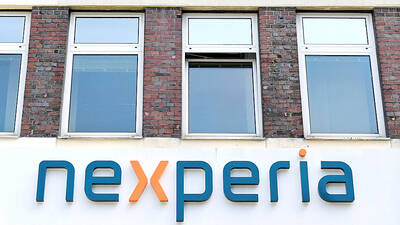Taroko Textile Corp (大魯閣纖維), a textile company aiming to transform itself into an operator of small-sized sports and recreation centers, said yesterday that it aims to set up 20 centers in China in the next three years after the first center it built in China’s Jiangsu province became profitable in the second month of operation.
The company launched the first center in April in a mall built by Japan-based retail and financial service provider Aeon Group in a suburban area of Jiangsu, and the center generated revenue of a 650,000 yuan (US$96,700) in May, exceeding its break-even point of 400,000 yuan a month, Rex Lin (林志松), CEO of the company’s overseas operations, said yesterday.
Jerry Hsu (許俊麒), vice president of Taroko, said that sales were higher than the company had forecast, as the suburban mall attracted more customers than they expected.
Taroko is expected to launch a center in Chengdu, China in October and another in Jinan, Shandong, China by the end of this year, Hsu said, adding that the company has high hopes for its Chengdu center.
Taroko’s sports and recreation center in Chengdu is located in a complex of department stores and office buildings built by Hong Kong-based real estate developer Wharf (Holdings) Ltd (九龍倉), and Taroko expects sales at the center to be higher than the one in Jiangsu, Hsu said.
By the end of next year, Taroko aims to increase the number of its centers in China to 10, Hsu said.
The 30 centers in Taiwan generated revenue of NT$66.7 million (US$2.22 million) last year, accounting for 7.43 percent of Taroko’s revenue of NT$897.94 million last year, according to the company.
With 92.57 percent of its revenue from the textile division, sales from its real-estate development and sports and recreation divisions will rise to above 50 percent from 2016, after its new mall in Greater Kaohsiung becomes operational at the end of next year, Hsu said.
The company plans to spend NT$4 billion to build the mall, which is the first project of the company’s real estate development division, and the mall is expected to generate NT$5 billion a year starting 2016, according to Taroko.
From January through last month, Taroko reported revenue of NT$429.32 million, down 12.13 percent from NT$488.59 million a year ago, according to the company’s filing to the Taiwan Stock Exchange.
Hsu said the decline was because the company closed its weaving division in China last year due to low profit margins.
Last quarter, the company registered losses of NT$60.76 million, up 4.67 percent from losses of NT$58.03 million the previous year, according to the filing.
Hsu said it would be difficult for the company to get back into the black this year because its real-estate development division would incur losses of NT$100 million in both this year and next year by building the mall in Kaohsiung.
However, Taroko has land properties with a market value of NT$1 billion, which could boost its profit if it can sell them, Hsu said.

Jensen Huang (黃仁勳), founder and CEO of US-based artificial intelligence chip designer Nvidia Corp and Taiwan Semiconductor Manufacturing Co (TSMC, 台積電) on Friday celebrated the first Nvidia Blackwell wafer produced on US soil. Huang visited TSMC’s advanced wafer fab in the US state of Arizona and joined the Taiwanese chipmaker’s executives to witness the efforts to “build the infrastructure that powers the world’s AI factories, right here in America,” Nvidia said in a statement. At the event, Huang joined Y.L. Wang (王英郎), vice president of operations at TSMC, in signing their names on the Blackwell wafer to

AI BOOST: Although Taiwan’s reliance on Chinese rare earth elements is limited, it could face indirect impacts from supply issues and price volatility, an economist said DBS Bank Ltd (星展銀行) has sharply raised its forecast for Taiwan’s economic growth this year to 5.6 percent, citing stronger-than-expected exports and investment linked to artificial intelligence (AI), as it said that the current momentum could peak soon. The acceleration of the global AI race has fueled a surge in Taiwan’s AI-related capital spending and exports of information and communications technology (ICT) products, which have been key drivers of growth this year. “We have revised our GDP forecast for Taiwan upward to 5.6 percent from 4 percent, an upgrade that mainly reflects stronger-than-expected AI-related exports and investment in the third

RARE EARTHS: The call between the US Treasury Secretary and his Chinese counterpart came as Washington sought to rally G7 partners in response to China’s export controls China and the US on Saturday agreed to conduct another round of trade negotiations in the coming week, as the world’s two biggest economies seek to avoid another damaging tit-for-tat tariff battle. Beijing last week announced sweeping controls on the critical rare earths industry, prompting US President Donald Trump to threaten 100 percent tariffs on imports from China in retaliation. Trump had also threatened to cancel his expected meeting with Chinese President Xi Jinping (習近平) in South Korea later this month on the sidelines of the APEC summit. In the latest indication of efforts to resolve their dispute, Chinese state media reported that

CHINESE EXPORT CURBS: A dispute between China and the Netherlands could halt chip supply, affecting vehicle production, US and European auto associations said Groups representing major automakers late on Thursday warned that a chip disruption stemming from a dispute between China and the Dutch government could quickly affect US auto production. Automakers and their suppliers received notice from chipmaker Nexperia (安世半導體) last week that it could no longer guarantee delivery of its chips, the European Automobile Manufacturers Association said, adding that manufacturing could be significantly disrupted. In the US, the Alliance for Automotive Innovation, which represents General Motors, Toyota, Ford, Volkswagen, Hyundai and nearly all other major automakers, urged a quick resolution. “If the shipment of automotive chips doesn’t resume — quickly — it’s going to